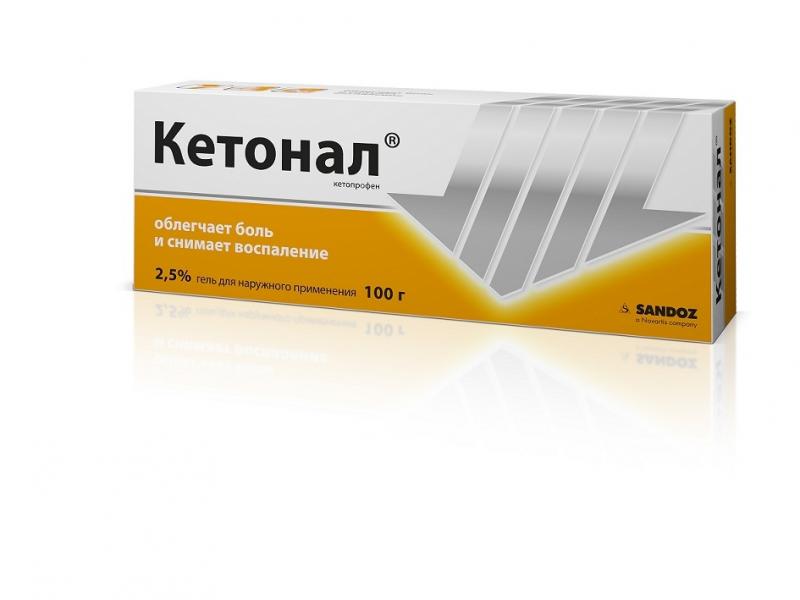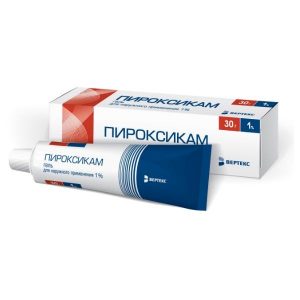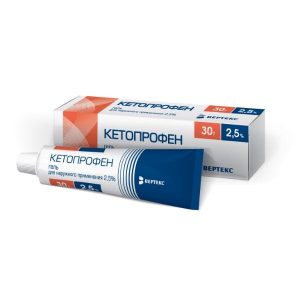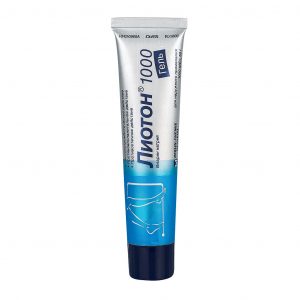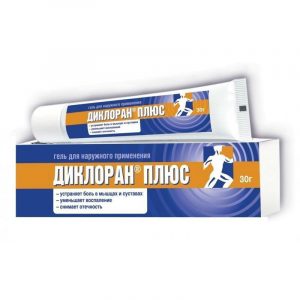Description
Release form
Gel for external use 2.5% uniform, colorless, transparent.
Packaging
100 g – aluminum tubes (1) – packs of cardboard.
Pharmacological action of
NSAIDs. It has analgesic, anti-inflammatory and decongestant effects. The mechanism of action is associated with inhibition of prostaglandin synthesis at the level of cyclooxygenase. In addition, ketoprofen inhibits lipoxygenase, the synthesis of bradykinin, stabilizes lysosomal membranes and inhibits the release of enzymes involved in the inflammatory process.
Ketoprofen does not adversely affect articular cartilage.
Pharmacokinetics:
Absorption
Ketoprofen is absorbed very slowly and practically does not accumulate in the body. Bioavailability is 5%.
Ketoprofen penetrates the subcutaneous tissue, ligaments and muscles, synovial fluid and reaches therapeutic concentrations there. The concentration of the drug in blood plasma is extremely low.
Metabolism and excretion
Ketoprofen is metabolized in the liver to form conjugates, which are mainly excreted in the urine. Ketoprofen is characterized by slow excretion in urine.
Pharmacokinetics in special clinical cases
Ketoprofen metabolism does not depend on age, the presence of severe renal failure or cirrhosis.
Indications
Symptomatic therapy of painful and inflammatory processes of various origins, including:
– rheumatoid arthritis and periarthritis
– ankylosing spondylitis (ankylosing spondylitis)
– psoriatic arthritis
– reactive arthritis (Reiter’s syndrome)
– osteoarthritis of various localization
– tendonitis, bursitis srdlp disease motor apparatus (including sports), bruises of muscles and ligaments, sprains, tears of ligaments and tendons of muscles.
Contraindications
– hypersensitivity to the components of the drug
– hypersensitivity to salicylates, thiaprofenic acid or other NSAIDs, to fenofibrate, UV blockers, perfumes
– impaired skin integument, eczema, dermatitis – a history of asthma attacks, caused by the use of NSAIDs and salicylates
– photosensitivity reactions in the anamnesis
– exposure to sunlight, incl. indirect sunlight and UV radiation in the tanning bed during the entire treatment period and another 2 weeks after stopping treatment
– III trimester of pregnancy
– children under 15 years of age.
Precautions: impaired liver and / or kidney function, erosive and ulcerative lesions of the gastrointestinal tract, blood diseases, bronchial asthma, chronic heart failure.
Use during pregnancy and lactation
The drug is contraindicated for use in the III trimester of pregnancy.
Use in I and II trimesters is possible in cases where the expected benefits of therapy for the mother outweigh the potential risk to the fetus.
The use of Ketonal ® during lactation (breastfeeding) is not recommended.
Special instructions
Avoid contact with the gel in the eyes, on the skin around the eyes, mucous membranes.
If any side effects occur, discontinue use of the drug and consult a doctor.
If the patient forgot to apply the gel, you should use it at the time when the next dose should be applied, but do not double it.
Ketonal ® gel for external use can be used in combination with other dosage forms of the Ketonal ® preparation (capsules, tablets, suppositories). The total daily dose, regardless of dosage form, should not exceed 200 mg.
When skin reactions occur, including developed when combined with octocrylene-containing drugs, treatment should be discontinued immediately.
To reduce the risk of photosensitivity, it is recommended that the gel-treated skin areas be protected from UV exposure during the entire treatment period and for another 2 weeks after the gel is discontinued.
Do not use as occlusive dressings.
Wash hands thoroughly after each application.
Influence on the ability to drive vehicles and control mechanisms
Data on the negative effect of the drug Ketonal ® gel on the ability to drive vehicles and other potentially dangerous activities, requiring concentration and speed of psychomotor reactions, no.
Composition of
ketoprofen 25 mg
[Excipients: (carbomer – 20 mg, trolamine (triethanolamine) – 37 mg, ethanol 96% – 285 mg, lavender oil (lavender essential oil) – 0.28 mg, water – 632.72 mg) – 1
Dosage and administration
For external use.
A small amount of gel (about 3-5 cm) is applied with light rubbing movements in a thin layer on the skin over the lesion 1-2 times / day.
It should be noted that 5 cm of the gel corresponds to 100 mg of ketoprofen, 10 cm to 200 mg of ketoprofen. The maximum daily dose when using the gel is 200 mg.
An occlusive dressing is not recommended.
Ketonal ® gel can be used in combination with other forms of Ketonal (capsules, tablets, rectal suppositories).
The duration of treatment without medical advice should not exceed 14 days.
Side effects
Local reactions most often occur.
Determination of the frequency of adverse reactions: very often (? 1/10), often (? 1/100 and
Allergic reactions: very rarely – angioedema, anaphylaxis.
From the skin and skin appendages: infrequently – erythema, itching, burning, eczema, transient dermatitis of mild severity rarely – urticaria, rash, photosensitivity, bullous dermatitis, purpura, erythema multiforme, lichenoid dermatitis, skin necrosis, Stevens-Johnson syndrome is very rare – an isolated case of severe contact dermatitis (due to poor hygiene and insolation), an isolated case of severe generalized photodermatitis, toxic epidermal necrolysis.
From the respiratory system: very rarely – asthmatic attacks (as a variant of an allergic reaction).
From the urinary system: very rarely – an isolated case of impaired renal function in a patient with chronic renal failure in isolated cases – interstitial nephritis.
Drug interaction
Since the concentration of the drug in blood plasma is extremely low, manifestations of symptoms of interaction with other drugs (similar symptoms with systemic use) are possible only with frequent and prolonged use.
The simultaneous use of other forms for external and local use (ointments, gels) containing ketoprofen or other NSAIDs is not recommended.
Concomitant use of acetylsalicylic acid reduces the degree of binding of ketoprofen to blood plasma proteins.
Ketoprofen reduces the excretion of methotrexate and increases its toxicity.
Interactions with other drugs and the effect on their elimination are not significant.
Patients taking coumarin-containing anticoagulant medications are advised to be treated under medical supervision.
Overdose
Symptoms: irritation, erythema, itching.
Treatment: should stop using the drug, rinse the skin thoroughly with running water. The patient should consult a doctor.
Storage conditions
The product should be stored out of the reach of children at a temperature not exceeding 25 ° C.
Shelf life
3 years.
Deystvuyushtee substance
Ketoprofen
Conditions of release from drugstores
Without prescription
Possible product names
KETONAL 2.5% 100.0 GEL
KETONAL GEL 2.5% 100G
KETONAL GEL D / NAR. NOTE 2.5% TUBE 100G
Ketonal gel d / ex approx 2.5% 100g Tube ind pack
Ketonal gel d / ex. approx. 2. 5% tube 100g Germany
Salyutas Pharma GmbH, Switzerland
